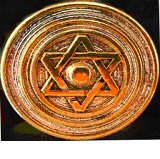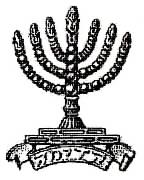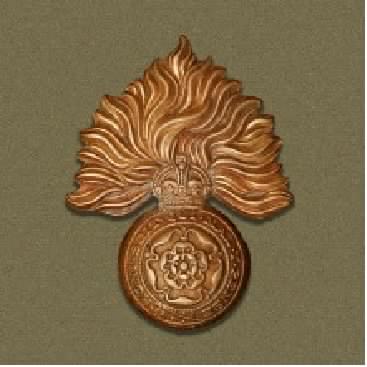|
Lt. Col. John Henry Patterson
The Christian godfather of the Israeli Army
The godfather of Yonni Netanyahu
By Jerry Klinger

Medallion of the Zion Mule Corp
The Zion Mule Corp was organized, six hundred and fifty men strong. With the blessing of the chief Rabbi of Alexandria, they sailed for Gallipoli. They sailed with and as part of the British army opening the first step in the creation of the later Israel Defense Forces.
Gallipoli was a tragic disaster for both the British and the Turks. Over a 130,000 lives on both sides were wasted in a major failed effort to pierce the soft underbelly of the Axis powers. After many months of carnage, the British withdrew. Nothing had been accomplished. But everything had been accomplished on the road to Israel. A few mules did it.
The Zion Mule Corp distinguished itself well in the hell of Gallipoli with courage, purpose and steadfastness. They showed themselves reborn examples of biblical Jewish soldiery. They demonstrated their willingness to bravely pay with their blood, which they did in Gallipoli, for Palestine.
Patterson wrote about his men: "Many of the Zionists whom I thought somewhat lacking in courage showed themselves fearless to a degree when under heavy fire, while Captain Trumpeldor actually reveled in it, and the hotter it became the more he liked it ..."
In January 1916, the Zion Mule Corps returned to Alexandria greatly reduced in numbers from disease and casualties.
The British reneged on their recruiting promises to the Jews.
In March, 1915, Major General Sir Alexander Godley had told the prospective Jewish volunteers, Do you have it in your hearts to shake the extended hand or to reject it? Today the English people have entered into a covenant with the Jewish people Two hundred men stepped forward at that call.
When the Zion Mule Corps returned to Egypt, the British disbanded the unit.
Patterson was invalided back to London. He was severely ill.
Jabotinsky was in London pursuing his frustrating dream of a Jewish army to liberate Palestine from the Turks. He had little success with the Allies and even less success with the Jews. The Zionists, at best timid and lukewarm to the idea, feared alienating one side or the other. Jews fought on both sides of the conflict. Jabotinsky was undeterred.
Throughout the Gallipoli Campaign, Jabotinsky kept himself up on what was happening. He maintained a friendly, responsive correspondence with Patterson.
Jabotinsky was in London when Patterson arrived. He was lobbying for a Jewish Army. Lord Kitchener, the British Secretary of War, was absolutely set against a Jewish army or even a fighting unit. It did not matter that the war was slaughtering millions of men on the bloody, mud cratered killing fields of Europe. It did not matter to Kitchener how desperate the need for recruits was, he would not create a special Jewish army from the huge Russian Jewish refugee population in England. He had no problem with other ethnic fighting units in the army. He did with a Jewish one. Kitchener would not reconsider.
Jabotinsky leaned that Patterson was in London recuperating. He wrote to Patterson and went to see him. Patterson asked Jabotinsky how goes it?
Frustrated and nearly despondent, Jabotinsky told Patterson what had happened to the Zion Mule Corps after his departure from Egypt. The Corps was disbanded. The men were given the option of enlisting in the British army and being dispersed throughout Europe. The promise given them, to fight for Palestine as a Jewish unit gone. Trumpeldor was also in London, Jabotinsky told Patterson. Trumpeldor was holding together a small core of men from the Zion Mule Corps who wanted to stay together. Kitchener would have none of it.
Presciently or perhaps prophetically, Patterson reflected to Jabotinsky
"Realities are stronger than Lord Kitchener," he said.
Jabotinsky asked for Pattersons help.
Without a moment of hesitation, Patterson said yes.
A few days after their meeting, June 5, 1916, Lord Kitchener sailed for a high level meeting with his Russian counterpart in the war. Kitcheners ship hit a mine and sank. They never found his body. The enemy of the Jewish Army was dead.
Within a week Patterson had made the necessary arrangements. Jabotinsky came to the home that Patterson was recuperating in. They ordered a cab and went to Parliament. While Jabotinsky waited in the Hall, Patterson wrote out a quick note and gave it to the guard. A few minutes later, a short man in a smart Captains uniform came out. Patterson and the Captain shook hands. They knew each other well from the Boer War and Gallipoli.
Patterson introduced Jabotinsky to Captain Leopold Amery.
Addressing Jabotinsky, Patterson said, Captain Amery knows of our project. Give him the latest update.
Amery listened intently to Jabotinsky. He was sympathetic to the Zionist ideal of a Jewish Army. Because of Patterson, Amery was a strong supporter of the Jewish Legion and Zionism but for different reasons. Amerys primary motivation was to use the Jews to help Britain wrest control of Palestine from the Turks for Britain.
Guiding Jabotinsky through the British ruling governmental maze, Amery brought Jabotinsky to Lord Derby, the new secretary of War. Derby had replaced Kitchener after Kitchener was killed. Derby supported the Jewish Legion idea. He assigned General Geddes to direct recruiting and arrange for the formalities of a Regimental uniform and identifying badge as a Jewish unit.
The Jewish Legion was born.
General Geddes worked closely with Jabotinsky in the process. He asked him who he would recommend to command the Regiment. Geddes had already asked Patterson for his opinion. Patterson declined recommending that a Jew should be in command. Jabotinsky thought differently. Jabotinsky understood there was only one man who had the fight, the needed political moxie, the British bulldog determination to face down the anti-Semites in the military and hardness needed to mold the fractious Jews into a cohesive fighting unitPatterson. Jabotinsky did not wait to respond.
There is only one nomineeeven though he is not a Jew, he must be our colonel, and I hope that one day he will be our general: Patterson.
Patterson accepted the command, July 27, 1917 and set to work.
With the approval of the Jewish Legion, opposition by the assimilationist British Jewish establishment swung into high gear. Lionel de Rothschild and Lord Swarthling joined forces to pressure Derby to cancel the Legion. Derby wavered but compromised by removing the name Jewish and anything that suggested the unit was Jewish. He changed the name from the Jewish Legion to the 38th Royal Fusiliers.
Patterson was energetic in his recruiting efforts within the large Russian refugee Jewish community in Britain. He assured them that the unit was a Jewish unit going to fight for Palestine. Russian Jewish refugees were not going to send their sons to fight and possibly die in the bloody fields of Europe to save Britains ally the hated, rabid, anti-Semitic Tsar. They would send their sons for Zion.
Patterson felt betrayed. He felt he had lied to the people he was trying to recruit for the Legion. He would not get men to follow him by lying to them.
A man with a deep sense of honor, Patterson submitted his resignation.
Chaim Weizmann and now Major Amery swung into action. They went to see Lord Milner who was a member of the War Cabinet. Milner had a long, heart to heart, talk with Derby.
Jabotinsky sought out the editor of the influential paper, The Times. The Times printed an excoriating editorial of Derby and the War Cabinet supporting Pattersons reasons for resigning.
Derby backed down. Patterson stayed as the regiments Colonel.

Derby assured the recruits, Patterson and the regiments supporters, they would only be sent to fight for Palestine. If they proved themselves on the battlefield, they would earn the official title of the Judean Regiment with the Menorah as their regimental badge. Until that point in time, they would be known as the 38th Royal Fusiliers.

Badge of the Royal Fusiliers
To Continue, Click Here
~~~~~~~
from the Winter 2015 Edition of the Jewish Magazine
Material and Opinions in all Jewish Magazine articles are the sole responsibility of the author; the Jewish Magazine accepts no liability for material used.
|